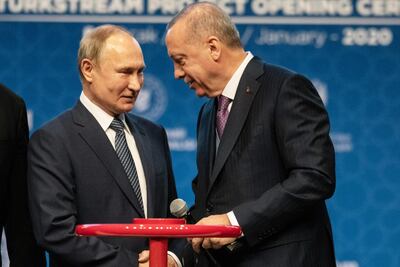The position of Russia with respect to its partners in Syria – Iran and Turkey – is looking increasingly uncomfortable.
Iran, Moscow's ally in the fight, is resentful of its failure to strongly oppose US sanctions against Tehran. Furthermore, there is growing anger in the ranks of the Russian military establishment following Turkey’s recent actions against the Bashar Al Assad regime in Syria, which risk opening yet another front for Moscow in the ongoing Syrian war and highlight the burden of an alliance with Damascus.
The core challenge Russia faces is to redefine a new vision and strategy for Syria beyond mere tactical steps. For one thing, further escalation of violence could destroy any chance of crafting a political and constitutional settlement that would relieve Russian forces as Moscow entrenches its presence in Syria further.
Another source of concern is the multiple, often contradictory roles of the US in the country. President Donald Trump may reactivate his personal involvement in Syria policy in the spring which would have implications for Moscow’s policies in the Middle East.
The Turkish President Recep Tayyip Erdogan, who fears the prospect of Washington making deals and decisions without consulting Ankara, is proceeding with confidence and determination to alter the facts on the ground, not only in Syria but in Libya, too.

Russia has called on Turkey to refrain from further “provocations”, and Ankara has indeed since toned down its rhetoric. Both countries’ militaries would still prefer to avoid direct clashes between their forces in Syria, including incidents that might lead to the downing of Russian warplanes. The consequences of such an event would be dire.
In the eyes of the Russians, Turkey must honour its prior agreements with them, and Mr Erdogan’s own bellicosity must end. The problem is that Moscow’s options are limited at this point. Ending communication with Turkey in Syria and disengaging from the Al Assad regime are both non-starters. But failure to contain the situation could preclude the political settlement that Russia needs in order to stabilise Syria.
For his part, Mr Erdogan wants to compel Moscow to reduce the commitments made to Mr Al Assad, particularly with respect to Idlib on the Turkish border, where the Russian military is supporting its Syrian counterpart in a major offensive. Mr Erdogan is not seeking to topple the Al Assad regime, nor is he demanding Russia abandon its alliance with Damascus altogether. Rather, Ankara wants to keep Idlib under Turkish influence. Russia, however, has only accepted Turkey’s influence in an area extending 5km beyond the latter’s border.
The US has played a role in emboldening Turkey’s actions in Idlib. The country’s special envoy for Syria, James Jeffrey, recently remarked that Washington is looking into how to give Turkey support within the framework of Nato. The US is increasingly weighing into the conflict there not only because of the massacres taking place against civilians in Idlib, which have caused more than 800,000 Syrians – mostly civilians – to flee, but also because Washington sees Turkish-Russian differences in Syria as an opportunity.
President Trump is inclined to personally steer the wheel of foreign policy on Russia, Turkey, and Iran. He is reportedly revisiting US foreign policy across the globe, not to deviate from its current trends, but rather to take stock of successes and failures. This would involve scrutinising various political fronts and bolstering his policies on economic sanctions. Mr Trump also wants to shore up support for his so-called Deal of the Century and to ensure that the Arab Gulf states present a united front against Iran.
This week, the US Senate passed a resolution requiring congressional consent for future military operations against Iran. Mr Trump may veto it, but he may also use the resolution to contain further escalation with Tehran. Although it continues to support the Al Assad regime, Iran is not directly involved in Russia and Turkey’s Syrian standoff, giving some limited respite to Moscow’s military strategists.
Those strategists are more concerned at the moment with a potential revival of Turkey’s Nato links, having thought Moscow succeeded in driving a wedge between Turkey and its Western allies through co-operation in Syria and the sale of missiles to the Turkish military.
Riding above all of these individual tensions, however, is the fact that Moscow, Washington, and Ankara all converge on their desire to avoid a large-scale conflict in Syria that would draw in the three countries as well as Israel. As Mr Jeffrey said, “the four major players…in Syria – that is Russia, the United States, Turkey and Israel – are being very careful militarily”. The problem however is that these major players do not care about the disastrous consequences of their battles for the human population of Syria. In this regard, they are anything but careful.
Raghida Dergham is the founder and executive chairwoman of the Beirut Institute



